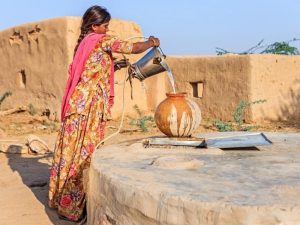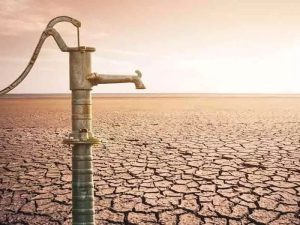The Parliamentary Standing Committee report also found excessive dependence on groundwater
 Photo: iStock
Photo: iStock
State- and central-level bodies that currently bear responsibility for issues related to water, lack coordination between them, a Parliamentary Standing Committee report has noted.
The report, tabled in the Lok Sabha two weeks ago, also recommended the Union Ministry of Jal Shakti (water resources) constitute a central body with representation from the bodies.
The bodies, alluded to by the committee, include:
- The Union Ministry of Rural Development, and Agriculture and Farmers’ Welfare
- State departments, state and central pollution control boards
- Dedicated authorities such as the Central Ground Water Board (CGWB) and the Central Ground Water Authority (CGWA)
Groundwater is a valuable but diminishing resource, concluded the report accessed by DTE.
State- and central-level bodies that currently bear responsibility for issues related to water, lack coordination between them, a Parliamentary Standing Committee report has noted.
The report, tabled in the Lok Sabha two weeks ago, also recommended the Union Ministry of Jal Shakti (water resources) constitute a central body with representation from the bodies.
The bodies, alluded to by the committee, include:
- The Union Ministry of Rural Development, and Agriculture and Farmers’ Welfare
- State departments, state and central pollution control boards
- Dedicated authorities such as the Central Ground Water Board (CGWB) and the Central Ground Water Authority (CGWA)
Groundwater is a valuable but diminishing resource, concluded the report accessed by DTE on March 31, 2023.
The Committee observed that dependence on groundwater for irrigation was excessive. This was so because water-intensive crops like paddy and sugarcane command higher minimum support prices (MSP), it noted.
Prior to this, the Committee couldn’t finalize a report and the subject was again taken up in its successive tenures — 2020-21, 2021-22, and 2022-23 — for detailed examination.
The development came in concurrence to the release of a United Nations report raising grave concern on “groundwater depletion as a global issue”. The latter had brought to light the reporting of significant groundwater depletion in China, India, Pakistan, the United States, and Australia
“Laws on groundwater management were passed in 19 states based on a model Bill circulated in 1970 and last revised in 2005. The Committee observed difficulties in implementing these laws due to the lack of guidelines,” it was argued in the Lok Sabha.
The Committee, meanwhile, recommended the Department of water resources, river development, and ganga rejuvenation takes urgent action in this regard.
The three departments should engage with the Department of Agriculture and Farmers’ Welfare to encourage fewer water-intensive cultivation crops and cultivation patterns, it asserted.
The Committee went on to observe widespread groundwater contamination “resulting from industrial activity”. They recommended that more funds under Jal Jeevan Mission (JJM), which aims to provide households with safe drinking water, can be allocated to areas with groundwater contamination.
“A lack of sharing of data and coordination between bodies responsible for addressing groundwater pollution such as state government departments, pollution control boards, and agencies such as the CGWA,” it underlined and recommended the proposed central groundwater authority should coordinate between them.
“The authority, once formed, should formulate a policy on groundwater pollution,” the report said. Personnel and resource shortages hinder state and central pollution control boards, it was further alleged. In this wake, the Committee insisted on addressing the shortage.
It further recommended amendment of the Water (Prevention and Control of Pollution) Act, 1974, “to enable pollution control boards to impose monetary penalties, as a less severe penalty than the outright closure of industrial units
More ‘reforms’?
 Photo credit: istock
Photo credit: istock
The panel also recommended the modification of schemes like Mahatma Gandhi National Rural Employment Guarantee Scheme and Pradhan Mantri Krishi Sinchayee Yojana to support the rejuvenation of existing water bodies.
There are schemes for recharging groundwater through rainwater harvesting in urban areas, such as Atal Mission for Rejuvenation and Urban Transformation (AMRUT). The Committee recommended that the Jal Shakti ministry coordinate these efforts.
Urban local bodies should be given more funds to maintain water bodies. The Atal Bhujal Yojana provides central financial assistance to state governments and local bodies for projects related to groundwater management.
The Committee recommended the scheme’s extension to all states facing groundwater scarcity as it is currently being piloted only in seven states.
Parallel to the release dates of the two mentioned reports, DTE had analyzed the groundwater crisis in Punjab state. This was also in the wake of the 2023 Global Water Conference organized in New York City in March, with an aim to raise awareness, define a roadmap and advance the water agenda.
Neerain is proud to republish this blog for spreading awareness about the situation of water, for our stakeholders. Credit whatsoever goes to the Author.
This blog is published by: –
We would like to spread this for the benefit of fellow Indians.
Author: Zumbish
Publish On: 04 April 2023
